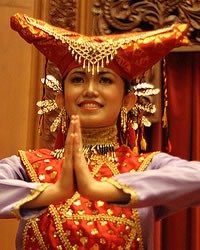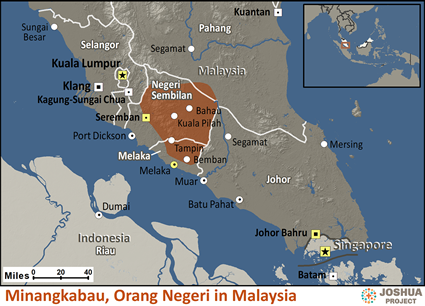The Minangkabau, or Minang, comprise most of the state of Negeri Sembilan in Peninsular Malaysia. As descendants from the Minangkabau people from West Sumatra, Indonesia, the Minangkabau of Malaysia have a distinct culture and their own royal line that dates back several centuries. The Minangkabau speak the national language of Malaysia, but they have their own dialect that reflects lingual roots in the language of their Indonesian heritage. Within Malaysia, the Minangkabau refer to themselves as Orang Negeri or person from Negeri.
The Orang Negeri Minangkabau are most noted for their adherence to adat pepatih (matrilineal inheritance). Certain areas of Negeri Sembilan have moved away from this tradition due to the complexities of the matrimonial ceremonies and the blending of communities with peoples from different Malay groups who use traditional male inheritance. However, the areas of Kuala Pilah, Tampin, Seri Menanti, and Jelebu are still strong in their unique culture and consistently practice this tradition.
The Orang Negeri Minangkabau place great emphasis on their women. To protect the rights of the female, the name and property are passed down through the line of the mother. Daughters are strongly encouraged to marry within the same people group or else they are not allowed to live on family land. Sons are allowed to marry outside of the people group, but they, too, forfeit their right to live on family land since the wife would have no land inheritance of her own. Newlyweds either live on their own or with the family of the bride.
Clan leaders within the Orang Negeri Minangkabau estimate that there are approximately 35,000 square kilometers of clan land in the region. This land is in the name of the female, but male clan leaders balance the scales of power. Clan leaders have their own titles within their suku (clan group) and strict hierarchy designates how many leaders each clan group is allowed.
Housing and architecture for the Orang Negeri Minangkabau have become more modern over the past generation though older, more traditional homes are still being occupied. The roof of a traditional home is peeked at both ends to represent the horns of a water buffalo. These roofs along with spicy food are two trademarks of the Minangkabau.
Malaysia does not provide easy access for Christian workers, and the Minangkabau are devout Muslims.
The Orang Negeri Minangkabau are devout Muslims in spite of their matrilineal heritage. Polygamy is rare within the Orang Negeri Minangkabau culture because it conflicts with a pure inheritance line. The aspect of female inheritance and men being unable to take a second wife draws criticism from more fundamental Islamic people groups.
The Orang Negeri Minangkabau practice the five pillars of Islam and wear Muslim clothing that is consistent with other Malay groups throughout Malaysia. A large majority of Minang women wear a head covering and the percentage that do not are of the younger generation.
Marriage ceremonies and funerals are in keeping with Islamic tradition and both male and female children are circumcised: boys when they are twelve years old and girls when they are still babies. Only the circumcision of the male is celebrated.
The Orang Negeri Minangkabau feel the need to protect their culture from future assimilation. As other areas of Negeri Sembilan have shown, mixing with other Malay groups results in a loss of their unique matrilineal customs. As a result, the Orang Negeri Minangkabau feel a sense of loss of identity. May the unique culture of the Orang Negeri Minangkabau be preserved and blessed as a culture designed by the All-Compassionate One.
Pray for the Orang Negeri Minangkabau people to seek and find the savior.
Pray for Indonesian Christ followers to go to them.
Pray for disciples who will make more disciples.
Scripture Prayers for the Minangkabau, Orang Negeri in Malaysia.
Southeast Asia Link – SEALINK, Copyrighted © Used with permission
| Profile Source: Joshua Project |

























